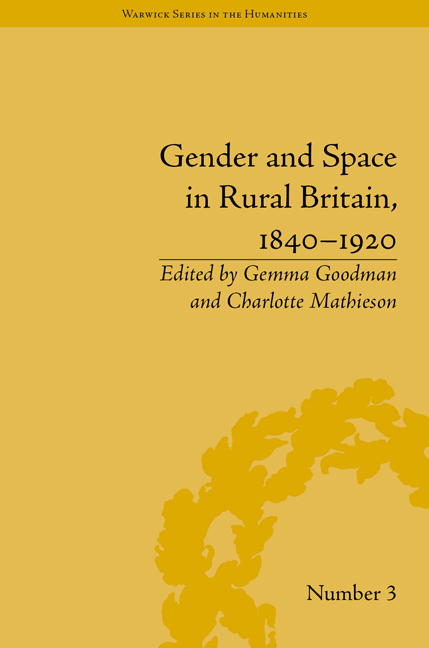Book contents
- Frontmatter
- Contents
- Acknowledgements
- List of Contributors
- Introduction: Gender and Space in Rural Britain, 1840–1920
- 1 Women in the Field
- 2 ‘Between Two Civilizations’: George Sturt's Constructions of Loss and Change in Village Life
- 3 At Work and at Play: Charles Lee's Cynthia in the West
- 4 ‘Going Out, Going Alone’: Modern Subjectivities in Rural Scotland, 1900–21
- 5 ‘Drowned Lands’: Charles Kingsley's Hereward the Wake and the Masculation of the English Fens
- 6 ‘Wandering Like a Wild Thing’: Rurality, Women and Walking in George Eliot's Adam Bede and The Mill on the Floss
- 7 ‘I Never Liked Long Walks’: Gender, Nature and Jane Eyre's Rural Wandering
- 8 Gertrude Jekyll: Cultivating the Gendered Space of the Victorian Garden for Professional Success
- 9 From England to Eden: Gardens, Gender and Knowledge in Virginia Woolf's The Voyage Out
- 10 The Transnational Rural in Alicia Little's My Diary in a Chinese Farm
- Notes
- Index
6 - ‘Wandering Like a Wild Thing’: Rurality, Women and Walking in George Eliot's Adam Bede and The Mill on the Floss
- Frontmatter
- Contents
- Acknowledgements
- List of Contributors
- Introduction: Gender and Space in Rural Britain, 1840–1920
- 1 Women in the Field
- 2 ‘Between Two Civilizations’: George Sturt's Constructions of Loss and Change in Village Life
- 3 At Work and at Play: Charles Lee's Cynthia in the West
- 4 ‘Going Out, Going Alone’: Modern Subjectivities in Rural Scotland, 1900–21
- 5 ‘Drowned Lands’: Charles Kingsley's Hereward the Wake and the Masculation of the English Fens
- 6 ‘Wandering Like a Wild Thing’: Rurality, Women and Walking in George Eliot's Adam Bede and The Mill on the Floss
- 7 ‘I Never Liked Long Walks’: Gender, Nature and Jane Eyre's Rural Wandering
- 8 Gertrude Jekyll: Cultivating the Gendered Space of the Victorian Garden for Professional Success
- 9 From England to Eden: Gardens, Gender and Knowledge in Virginia Woolf's The Voyage Out
- 10 The Transnational Rural in Alicia Little's My Diary in a Chinese Farm
- Notes
- Index
Summary
In George Eliot's early fiction – the short stories of Scenes of Clerical Life (1857–8) and the novels Adam Bede (1859), The Mill on the Floss (1860) and Silas Marner (1861) – a range of locations serve as landscapes for crafting the ‘rural realism’ that Eliot found to be lacking in many literary and artistic representations of rural spaces. Drawing on the scenes of her early years in Warwickshire and further developed through meticulous research into agricultural life and rural traditions, these works are tightly plotted against sharply observed details of the agricultural landscape – harvest dates, flora and fauna – and enlivened with acute attention to the distinct local dialects and customs that give each rural location its individual characteristics. As critics have often remarked, Eliot's use of early nineteenth-century settings can at times evoke a romanticized nostalgia for an idyllic pre-Industrial landscape, and despite the intention to better depict the rural working classes, Eliot's social vision remains limited in scope. Yet at the same time the human interactions that play out in these places are often far from idyllic, demonstrating the moral complexities of socio-cultural ideologies that shape, and are shaped by, the rural locale.
In the first two full-length novels, Adam Bede and The Mill on the Floss, gender ideologies form a central point of critique in Eliot's examination of the rural: the stories of Hetty Sorrel in Adam Bede and Maggie Tulliver in The Mill on the Floss examine the implications of social and sexual transgression for women within the rural community.
- Type
- Chapter
- Information
- Gender and Space in Rural Britain, 1840–1920 , pp. 87 - 102Publisher: Pickering & ChattoFirst published in: 2014



